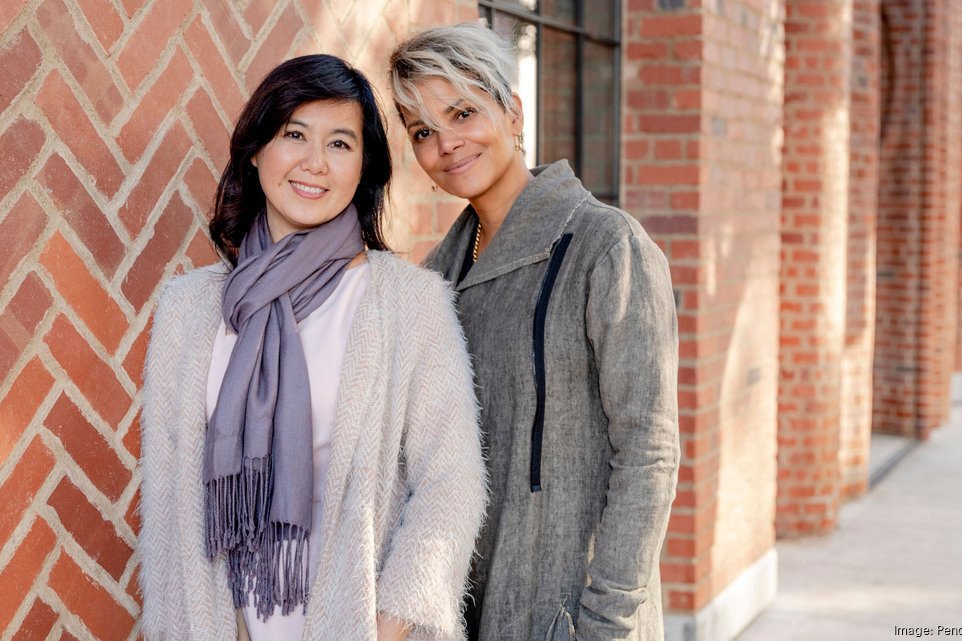Pendulum, formerly Whole Biome, is a QB3 incubator alum. From the story by Sarah Bloomberg at Bay Area Inno.
Pendulum CEO Colleen Cutcliffe and with actress Halle Berry, who holds an equity stake the company.
Academy Award-winning actress Halle Berry says she has found her "second act" at a San Francisco-based biotech startup.
The "Monster's Ball" star joined Pendulum Therapeutics earlier this year as the startup's chief of communications, and on Thursday, she said that working with the company would be her "second act."
"This will very much be my second act," Berry said during a Bloomberg Technology conference in San Francisco. But she quickly shot down any speculations that her work with Pendulum might indicate an interest in pursuing other opportunities within venture capital. "No … At 56 years old, I really realized that I'm kind of done being the dancing bear. So, I really want to have a second act that's as meaningful as my first act."
Pendulum — co-founded by CEO Colleen Cutcliffe, CTO James Bullard and chief scientific officer John Eid in 2013 — is developing new strains of probiotics to improve gut health. The company describes it as a "medical probiotic" but its products are not approved by the FDA to treat specific conditions.
"We'd all love to have more regulation in the space. And especially as this grows, I do think it's the responsibility of the industry to make sure that people aren't being fooled," Cutcliffe said during a panel discussion with Berry.
The company sells four types of probiotic pills directly on its website with discounts available for monthly subscriptions. Prices range from $66 for a single strain to $215 for a formula containing five strains that was developed to support blood sugar management in people with Type 2 diabetes.
Berry said she joined Pendulum after taking Pendulum's products for a year and seeing great results. She also recounted previous health struggles with diabetes, brain fog and sleep.
Berry has claimed for years that she was able to wean herself off of insulin, which is prescribed for managing Type 1 diabetes, through diet and exercise after being diagnosed with the disease at a young age. There is no cure for Type 1 diabetes, though, according to the Mayo Clinic.
Pendulum says that its "Glucose Control" formula can help reduce A1C levels, or blood sugar levels, in people with Type 2 diabetes, and Cutcliffe compared its effects to a class of drugs known as GLP-1 agonists such as Ozempic.
"Our flagship product was intended to help the body naturally produce GLP," Cutcliffe said.
Ozempic and similar drugs like Wegovy, Saxenda and Mounjaro were developed to treat chronic obesity, but the popularity of these drugs with people who don't have underlying conditions, particularly celebrities, has caused shortages for patients.
"I'm not gonna say what's right or wrong. Everybody has to make this choice for themselves," Berry said, "but I've always been sort of the natural, holistic route. I do it with diet … and exercise and think that's been really helpful in my life and managing my diabetes. So that's how I go about it."
Pendulum has raised $122.5 million in funding and was valued just shy of $300 million in 2021. Its investors include Sequoia, the Mayo Clinic, DCVC, True Ventures, Johnson and Johnson, Felicis and Khosla Ventures, according to PitchBook. In 2016, it received a grant from the U.S. Department of Health and Human Services for $225,000.
And there are many other Bay Area companies and organizations that are researching new ways to treat diabetes or improve gut health:
Berkeley-based Carmot Therapeutics has raised more than $380 million for its research into developing drugs that modulate gut hormones.
Redwood City-based Biomea Fusion is developing a once daily drug that could prove helpful for both Type 1 and Type 2 diabetes.
South San Francisco-based Structure Therapeutics is also developing a drug for Type 2 diabetes and obesity.
And University of California researchers are studying the application of CRISPR technology on microbiomes for issues as varied as obesity and reducing cow burps (which produce large amount of methane).
In March, WeightWatchers also jumped into the obesity drug market for the first time by buying Weekend Health, a San Francisco-based diabetes-focused telehealth service that operates under the brand name Sequence.
And a telehealth services based in San Francisco, Found Health, has raised $132 million since it was founded in 2019.


